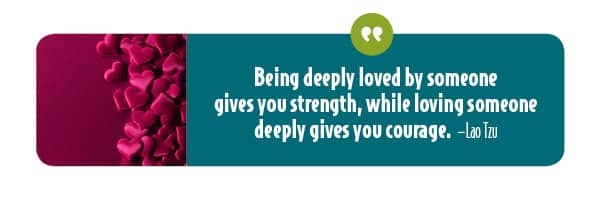Research shows that open communication is the best predictor of relationship satisfaction. But when you're rushing to work, working a full day, picking the kids up from school, then off to soccer practice, who has time for a meaningful conversation? Our schedules can be relentless!
An open, honest conversation about your relationship might feel like the last thing you want to do at the end of a long day. And when you finally sit down to talk with your partner, you might find yourself nodding and saying "uh-huh" more than staying present. Although a half-hearted response is understandable, it doesn't promote connection or closeness nor do unresolved conflicts get handled.
So, how do you create better communication in the midst of a full life?
Estimated reading time: 6 minutes

The First Step to Better Communication in Marriage and Love
First, you have to look at your communication with your partner honestly. Too often, we tolerate disrespect (no matter how small) or emotional distance from our partner, which can become detrimental relationship habits.
Examine your relationship challenges.
- Is there a lack of communication with your partner?
- Do you end up fighting every time you try to talk?
- Are finances and budgeting common themes of disagreement?
- What are your communication issues?
- When do you connect best and truly communicate?
- How long has it been since you've REALLY felt heard and understood by your partner?
- Do you work through conflicts to an agree-upon resolution?
- Is the majority of your communication strictly logistical?
- Do you frequently approach your partner with complaints?
- Are you, your partner, or both of you lacking communication skills?
For instance, a common issue with couples is pretending to listen to their partner. However, when you're pretending to listen, your partner isn't going to feel heard. No one likes a half-hearted listener! And you're going to miss important things they're trying to share.
Another common problem for couples is competing for their love needs to be met. For example, if you're too tired, your need for sleep may be interfering with your partner's need to talk or be intimate. When your needs are competing with your partner's, no real connection is possible.
The key to healthy—and engaging—communication is to be deliberate in creating opportunities for meaningful connections. With busy schedules, carving quality time for conversation with your partner is crucial.
Related reading: "The Stop, Drop, and Roll of Successful Communication in Relationships."

Communication Is Key in a Love Relationship
Many people would tell you that they are good communicators; often, that's not accurate. Then you add intense emotions and conflict to the brew and communicate frequently breaks down. Mix in cognitive biases and childhood conditioning factors, and it's rare for a couple to communicate effectively.
Excellent communication is a skill. And like any skill, it can be strengthened through practice.
Three Tips for Better Communication in Your Relationship
Communicating mindfully with the three tips below allows you to practice awareness and remain present with your partner. These simple mini-skills can help you improve communication channels between you and your partner to build (or strengthen) a happy, healthy relationship.
TIP 1: Make Communication a Daily Ritual
The best way to strengthen your communication skills is to practice them regularly. Experts at the Gottman Institute recommend setting aside time to connect with your partner daily, instead of going through the motions in "relationship autopilot."
Don't just talk to your partner—communicate with them. While speaking, listening, and spending time with your partner each day, commit to being more present in the moment. That means that you choose times when your phones are silenced and set aside.
Give your partner your full attention. Attentively listen rather than merely nodding as you play badminton with thoughts about work or the kids or what you're going to make for dinner. Your partner will be able to feel the difference between a mindful conversation and a conversation that's on autopilot, and this small difference can help you both feel loved and understood.
.jpg?width=836&name=Couple%20sitting%20on%20loveseat%20drinking%20tea%20(2).jpg)
TIP 2: Help Your Partner Feel Heard by Expressing Empathy
Receiving empathy is a human need. We might assume empathy comes naturally, but we are not born empathetic, emotionally intelligent, or resilient—we learn how to be so!
Responding to challenges with empathy requires practice. Thankfully, empathy is a habit you can develop and strengthen every day. Each time you interact with your partner, you have an opportunity to choose understanding over indifference, engagement over passivity. Set the intention (i.e., make a mindful choice) to express empathy to your partner in your daily conversations.
The two critical steps toward developing empathy, according to UC Berkeley, is radical listening and vulnerability. Radical listening means actively choosing to be mindful and present as your partner is talking (like we talked about in the first tip!), and vulnerability means having the courage to open up to your partner about your feelings. The combination of these two skills comprises our empathetic abilities, and we must strengthen both to cultivate empathy in our relationship.
Related Reading: "How to Use Empathy to Strengthen Your Marriage"
TIP 3: Release Judgment While Listening to Your Partner
We all know how frustrating it is to sit down for a serious conversation with your partner, only to see them shut down or not have anything to say. Nothing inhibits open dialogue quicker than judgment and criticism.
Creating a safe space for your partner is crucial and encourages them to open up and share.
Choose to see your partner and their needs in a positive light. Get curious and suspend judgment when a challenge confronts you. You can use a mindfulness practice of loving-kindness to generate positive feelings toward them.
To get in the right mindset, it's helpful to call to mind specific things that you love about your partner. Connecting with happy memories and remembering endearing traits enables you to unfold a more authentic experience and bring out the best in your partner.
Related Practice: "3 Important Lessons on Mindful Communication"
See the Results of Mindful Communication for Yourself!
Strengthening your mindful communication skills in your relationship will help you build a stronger foundation. As a result, you will feel more connected to your partner, and your relationship will become more resilient to setbacks.
Mindful communication provides you with the tools needed to approach relationship challenges with empathy and respect. When connected and unified as a couple, you can confidently address whatever difficulties arise together.
Deep Dive: "If You Want a Successful Marriage, Increase Self-Mastery!"
If you're ready to take the next step toward learning and practicing empathy, check out Heartmanity's Real Empathy, Real Solutions. Or contact us about premarital coaching and marriage mentoring programs today.
Transforming relationships is our business!








